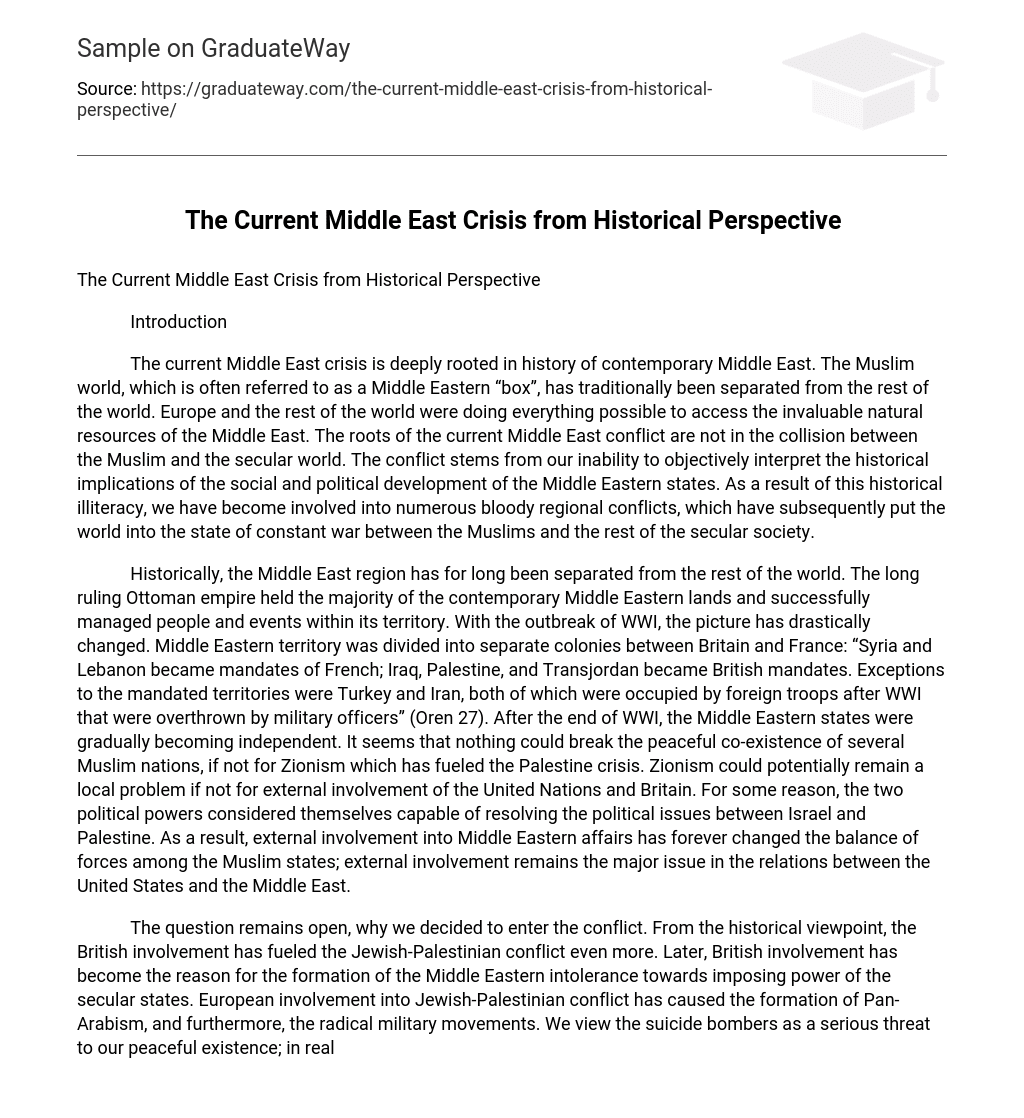Introduction
The current Middle East crisis is deeply rooted in history of contemporary Middle East. The Muslim world, which is often referred to as a Middle Eastern “box”, has traditionally been separated from the rest of the world. Europe and the rest of the world were doing everything possible to access the invaluable natural resources of the Middle East. The roots of the current Middle East conflict are not in the collision between the Muslim and the secular world. The conflict stems from our inability to objectively interpret the historical implications of the social and political development of the Middle Eastern states. As a result of this historical illiteracy, we have become involved into numerous bloody regional conflicts, which have subsequently put the world into the state of constant war between the Muslims and the rest of the secular society.
Historically, the Middle East region has for long been separated from the rest of the world. The long ruling Ottoman empire held the majority of the contemporary Middle Eastern lands and successfully managed people and events within its territory. With the outbreak of WWI, the picture has drastically changed. Middle Eastern territory was divided into separate colonies between Britain and France: “Syria and Lebanon became mandates of French; Iraq, Palestine, and Transjordan became British mandates. Exceptions to the mandated territories were Turkey and Iran, both of which were occupied by foreign troops after WWI that were overthrown by military officers” (Oren 27). After the end of WWI, the Middle Eastern states were gradually becoming independent. It seems that nothing could break the peaceful co-existence of several Muslim nations, if not for Zionism which has fueled the Palestine crisis. Zionism could potentially remain a local problem if not for external involvement of the United Nations and Britain. For some reason, the two political powers considered themselves capable of resolving the political issues between Israel and Palestine. As a result, external involvement into Middle Eastern affairs has forever changed the balance of forces among the Muslim states; external involvement remains the major issue in the relations between the United States and the Middle East.
The question remains open, why we decided to enter the conflict. From the historical viewpoint, the British involvement has fueled the Jewish-Palestinian conflict even more. Later, British involvement has become the reason for the formation of the Middle Eastern intolerance towards imposing power of the secular states. European involvement into Jewish-Palestinian conflict has caused the formation of Pan-Arabism, and furthermore, the radical military movements. We view the suicide bombers as a serious threat to our peaceful existence; in reality, history recommends that we pay more attention to our own actions and attitudes towards the Middle East. These attitudes and actions largely determine the Middle Eastern reaction which frequently turns into open violence. Deeper research proves that the majority of suicide bombers “are motivated by Islamic fundamentalism and hatred of the occupation” (Cockburn 108). In his book on Iraqi crisis, Patrick Cockburn supports these ideas, and pays special attention to the historical blindness of the American state in Iraq. “Iraq is a mosaic of communities with different interests, but during the first disastrous year of the occupation the U.S. showed a genius for offending everybody simultaneously. Even the Kurds, America’s one reliable ally in the country, were outraged to discover that the Pentagon was hoping to bring in 10,000 Turkish troops to police western Iraq” (110).
Historical illiteracy followed the United States before and after entering Iraq. Evidently, a better knowledge of history would save the U.S. from the majority of tragic and irreversible mistakes. Looking through the historical prism, the Middle Eastern countries did not require any external support: “the successful U.S. invasion […] lacked legitimacy in the eyes of Iraqis and the world (Cockburn 109). That support was taking the form of an extremely misbalanced military approach, and has swiftly turned into a mass political catastrophe which impacted all Middle Eastern states. Back to 1947, the Palestinian attack on Jewish settlements became the consequence of the UN resolution which approved “partition resolution” (Oren 49). As the Arab states were seeking resolution within their limited territories, the United States kept to the ideas of creating an Arab federation “in which Jews would enjoy local autonomy” (Oren 49). Those American moods have greatly changed the relations between the Arabs and the Jews: the bi-national country was put into the state of the constant military opposition, in which the U.S. and the European political organizations played the leading roles. The suicide bombers, the military conflicts and bloody revolutions – all those have grown from the evident Middle Eastern resistance to external occupation. Being unable to properly interpret the historical and political basis for the Palestinian-Jewish conflict, the United States have acquired an image of a new imperialist state which was constantly fueling the tension between all Middle Eastern nations.
Conclusion
The Middle Eastern states did not give us the right to resolve their conflicts and to promote democratization within their territories. External involvement has forever divided the world into the two large camps: the secular and the Muslim. In the eyes of contemporary society, the Muslim world looks as a continuous radical military threat to the developed world. In reality, we are guilty for what currently takes place in the Middle East. We have undertaken the roles which we were not able to carry; external involvement into the Middle Eastern local affairs has become the major cause of the current Middle East crisis. However, we have not learned our lessons well; we make the same mistakes, increasing the opposition between the two worlds, and making the conflicts between different Eastern states even more complicated.
Works Cited
Cockburn, P. The Occupation: War and Resistance in Iraq. Verso, 2007.
Oren, M.B. Six Days of War: June 1967 and the Making of the Modern Middle East. Oxford
University Press, 2002.





